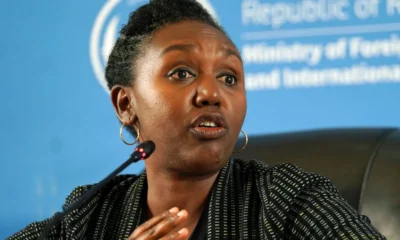Ramathan Ggoobi
31 years in power, and still missed!
The world is mourning yet another iconic
When Lee Kuan Yew talked to Ugandans by talking to Americans
The world is mourning yet another iconic leader of the 20th Century. Lee Kuan Yew, each with a unique contribution to humanity.
Lee’s main feat was moving Singapore, a very small country without natural resources, from poverty to plenty within one generation. He leaves Singapore at a time when her per capita income (US$55,000) is higher than that of its erstwhile colonizer, the Great Britain ($41,000) and even United States ($53,000). Yet in 1965, when Singapore separated from Malaysia, it was ranked among the poorest countries on this planet with a per capita income of only $515.
This unprecedented success did not come by accident. It was not even a miracle, as some economists often refer to East Asian extraordinary economic progress. Singapore’s success came as a result of Lee Kuan Yew’s heroic leadership credentials and his vision.
Back in 1994, legendary journalist Fareed Zakaria interviewed Lee, and their conversation was published in Foreign Affairs. In the interview, Zakaria endeavoured to probe Lee on the pros and cons of the United States as a model for other countries vis-à-vis the “Asian model”.
Uganda is one of the many countries around the world that are struggling to transform their societies in the shadow of the United States. So I found this interview quite enlightening and thought I should put parts of it in the context of our own situation.
The family
Zakaria asked Lee if a country can develop by embracing the American model (democratic pluralist political system and capitalism), and if there was another viable model for political and economic development. This is what Lee had to say:
“…The fundamental difference between Western concepts of society and government and East Asian concepts …is that Eastern societies believe that the individual exists in the context of his family. He is not pristine and separate. The family is part of the extended family, and then friends and the wider society. The ruler or the government does not try to provide for a person what the family best provides.
“In the West …the government came to be seen as so successful that it could fulfill all the obligations that in less modern societies are fulfilled by the family. This approach encouraged alternative families, single mothers for instance, believing that government could provide the support to make up for the absent father.
“…the family is the building brick of society. There is a little Chinese aphorism which encapsulates this idea: Xiushen qijia zhiguo pingtianxia. Xiushen means look after yourself, cultivate yourself, do everything to make yourself useful; Qijia, look after the family; Zhiguo, look after your country; Pingtianxia, all is peaceful under heaven.
“…Governments will come, governments will go, but this endures. We start with self-reliance. In the West today it is the opposite. The government says give me a popular mandate and I will solve all society’s problems.”
Dependence on the State
Mr. President, when I read these lines my mind, at once, thought about my country. Under your leadership, Ugandans have been given the false impression that the NRM government can and will solve all their problems. It will educate their children for free, give them free medicine, and that government will provide for them.
There is a popular maxim these days, among Ugandans. Whenever media interviews a Ugandan they say, “Tusaba government etuuyambe,” which can directly be translated as, “We request for government help.” People of Uganda have developed an excessive sense of entitlement and dependence on the State. Could this be one of the impediments to economic and social progress of our country? What happened to the pride of Ugandans? Did hastened pluralist democratic politics erode NRM’s legitimacy and caused panic that bred political corruption?
Mr. President, you are on record telling people how they shouldn’t worry producing as many children as they want since the NRM will educate them for free under the UPE (universal primary education) and USE (universal secondary education). You even threatened to arrest head teachers who asked parents to pay some little money to feed their children while at school.
You also went a step further and started giving people money directly in cash, purportedly to help them get out of poverty. All this is being done to buy political support. Now most young people expect free money from politicians and government for them to do anything — participate in electoral exercises, participate in community and other civil work.
Excessive politics of NRM is slowly destroying the foundation of our societies. Children expect reward to offer labour to their families. Families are collapsing under the weight of mechanically enforced “women emancipation”. Young girls are growing up with a wrong attitude that gender equality means women are no longer subordinate to their husbands. Consequently, egos are building up to boiling points in most elite families. Women have become rebels against their husbands, and the latter are responding by becoming more negligent towards their families.
Interestingly this breakdown in family cohesion, as a consequence of government interference with kinship structures, has affected the top NRM leadership that brought it more than anybody else. Very few bush-war freedom fighters still own a family. Your wives rebelled against you, because they felt they too became men in their own way, thanks to the emancipation. A few of you who are still hanging around with your wives are doing it for political and social convenience, but the cohesion was forever eroded away.
Violence in schools
Mr. President, good you have now realised we shall not build an economy without the household. Lately, you are emphasizing household incomes as a requisite for wealth creation and national economic transformation. That is a very big step forward. At one point you used to sing GDP figures as if GDP is produced by the macro economy.
Now one more important fact you need to realise is that you cannot increase household incomes and build the economy in a socially chaotic family environment. The critical unit of any economy is the family. Most critical ideas that transform societies are conceived in bedrooms before they evolve into boardroom decisions.
This is exactly what Lee Kuan Yew was communicating in that interview. He decried the American model of development, which we espouse a lot, as threatening to social order. He said, for example, “…when you have violence in schools, you are not going to have education, so you’ve got to put that right. Then you have to educate rigorously and train a whole generation of skilled, intelligent, knowledgeable people who can be productive. I would start off with basics, working on the individual, looking at him within the context of his family, his friends, his society. But the Westerner says I’ll fix things at the top. One magic formula, one grand plan. I will wave a wand and everything will work out. It’s an interesting theory but not a proven method.”
Look at our education system in Uganda today. Children have more “rights” than teachers! Gone are the days when teachers were given the full mandate to shape and nurture children since they spend more time with them. Today, “children rights”, as we copy them from the west, mean that a child cannot be sanctioned by anyone other than the State. Not even their own parents!
At school, where children spend most of the time, teachers have only one responsibility; to pump academic matter into the head of this uncultured and ‘unsocialised’ young man or woman whose only ideal goal in life is to score high grades in sciences, numbers or literature to enable him/her go to university, earn a first-class degree, get a job in UMEME or MTN or URA or in a government department to steal a few million shillings to build a big house on top of one of the ever expanding Kampala hills, put up a lavish wedding and spend the change in the bars and casinos that are mushrooming in Kampala.
NRM brought the American culture of people thinking of themselves as wealthy because they live in very big, expensive houses, drive big cars, and travel around the world. Young people are not aware that by earning big incomes each year and spending it all, they are not getting wealthier. In the vocabulary of many young people, terms such as “net worth” do not feature at all. No wonder
Comments


























